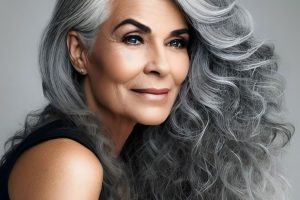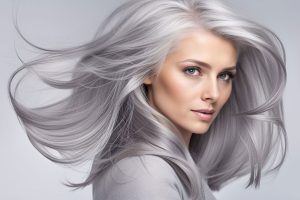The Role of Extrinsic Factors in Skin Aging: A Comprehensive Examination
The process of skin aging is a complex interplay of multiple factors. While our genetics and biological processes play a significant role, environmental and lifestyle factors – known as extrinsic factors – also contribute substantially to how our skin ages. This in-depth analysis focuses on these external factors, including UV radiation, smoking, alcohol consumption, stress, poor nutrition, and pollution, which can significantly influence skin’s health and aging process.

Skin Aging
The Detrimental Effects of UV Radiation
UV radiation, primarily from sun exposure, is one of the most significant contributors to skin aging and skin cancer. While most individuals understand the risks associated with tanning and sunbathing, it’s the cumulative UV rays from daily exposure that cause significant damage. It is crucial to use a broad-spectrum sunscreen or a daily moisturizer with built-in sunscreen every day to counteract these effects.
The Impact of Smoking on Skin Health
Beyond its well-known detrimental impact on lung health, smoking wreaks havoc on the skin. It generates an immense quantity of free radicals – unstable molecules that accelerate aging at a biochemical level. Over time, these molecules cause skin wrinkling and sagging, particularly on the face and neck. Smoking also starves the skin and body of oxygen, disrupting blood flow and hindering the skin’s ability to receive adequate nutrients, leading to an accumulation of cellular waste.
The Dehydrating Influence of Alcohol
Excessive alcohol consumption negatively affects skin health. It impedes the body’s ability to repair itself and disrupts the distribution of essential nutrients to the skin and body tissues. Alcohol also dehydrates the skin by drawing essential water out of tissues, causing the skin to appear dull, dry, and aged.
Stress: An Invisible Enemy of Youthful Skin
Stress plays a substantial role in premature aging of all organs, including the skin. Research confirms that stress triggers biochemical changes at a cellular level leading to tissue damage – a process we commonly refer to as aging. Mitigating stress through exercise, relaxation techniques, a healthy mindset, and relaxing treatments like facials, aromatherapy, and massages can help reduce these detrimental effects.
Poor Nutrition: A Catalyst for Dull, Aging Skin
Unhealthy eating habits rob the skin of the nutrients needed to maintain, protect, and repair itself, preventing it from retaining its youthful appearance. A well-balanced diet allows the body to nourish the skin’s delicate tissues. Often, the first signs of eating disorders manifest in the dull complexion associated with repeated nutrient deprivation.
Pollution: The Silent Aggressor
Exposure to pollution generates free radicals, hampers proper oxygen consumption, and affects not only the skin but also the lungs and other internal organs. Routine washing and mild exfoliation can help remove the buildup of pollutants that settle on the skin’s surface throughout the day. Daily moisturizers, protective lotions, and even foundation products can provide an additional layer of protection against airborne pollutants.
In conclusion, understanding and addressing these extrinsic factors is pivotal in managing skin health and slowing the aging process. Although we may not have control over our genetics, we can certainly modify our environment and lifestyle choices to mitigate the negative impacts of these extrinsic factors. Doing so will contribute to healthier, more radiant, and youthful-looking skin.






